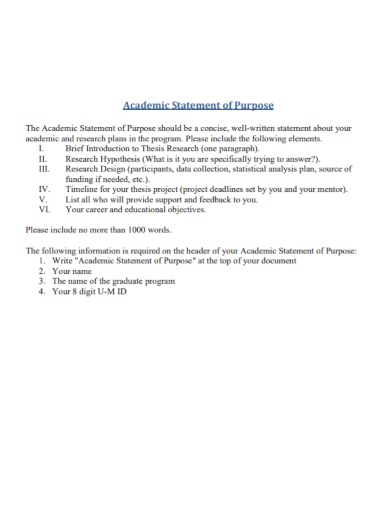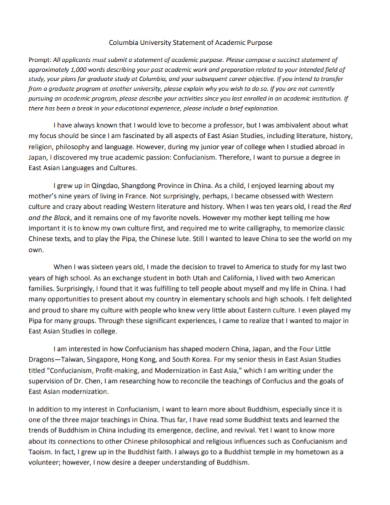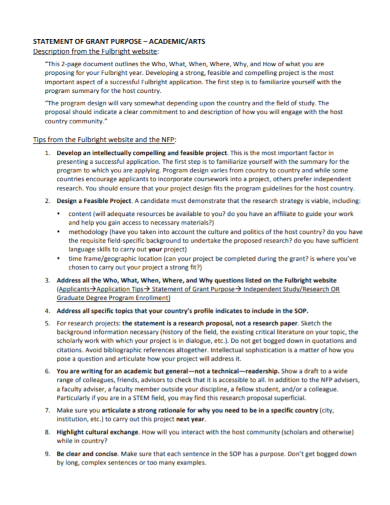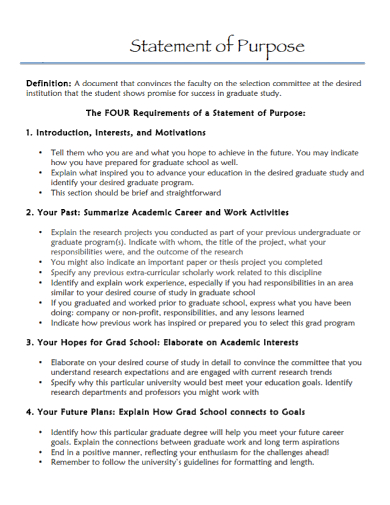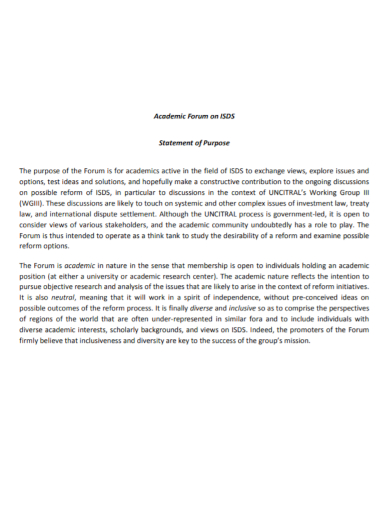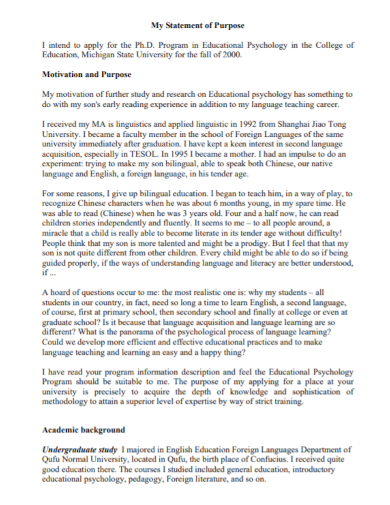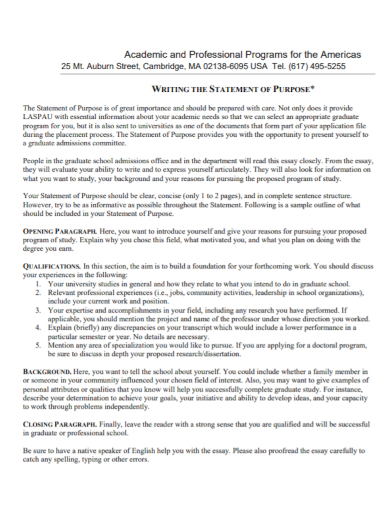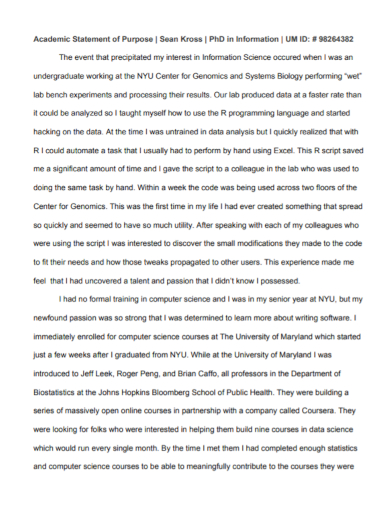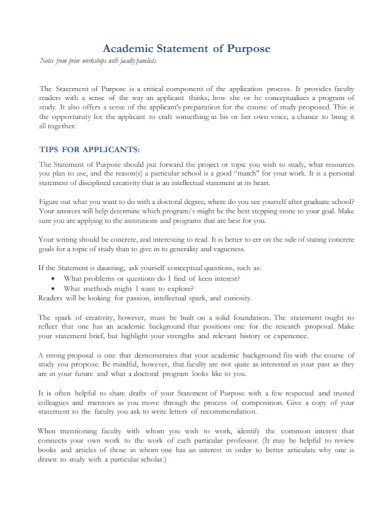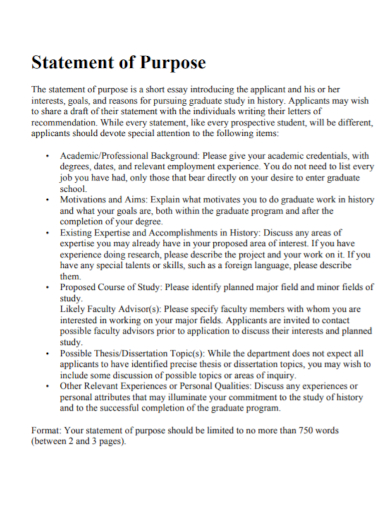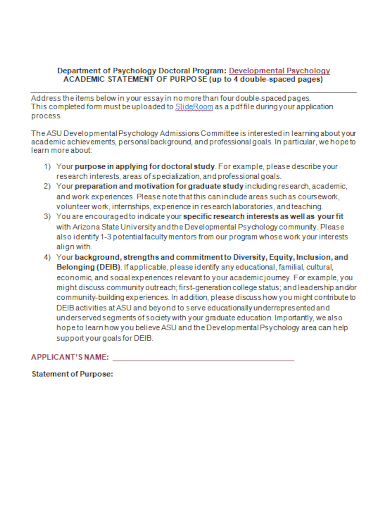Dreaming of getting a Master’s degree or a Ph.D.? The first step to achieving that dream is to apply for a program or field of study that you are highly interested to study and conduct research and make a contribution to the field. There are requirements needed to be able to enter and get accepted into the program and one of the requirements needed is a statement of purpose. In this article, we will discuss how to make a statement of purpose and some tips on what to put and not to put in your statement.
10+ Academic Statement of Purpose Samples
1. Academic Statement of Purpose
2. University Statement of Academic Purpose
3. Academic Statement of Grant Purpose
4. Academic Career Statement of Purpose
5. Academic Forum Statement of Purpose
6. Academic Personal Statement of Purpose
7. Academic Professional Statement of Purpose
8. Sample Academic Statement of Purpose
9. Standard Academic Statement of Purpose
10. Academic Applicant Statement of Purpose
11. Academic Psychology Statement of Purpose
What is an Academic Statement of Purpose?
The statement of purpose, or personal statement, is a part of the application requirements for masters and Ph.D. applications. It is quite similar to a cover letter when applying for a job. The statement of purpose must convince the faculty in the program you’re applying for that you are qualified and motivated to pursue it.
How to Make an Academic Statement of Purpose?
Here are some tips on how to make your statement of purpose:
Show Your Qualifications
Mention your qualifications in the statement. Do not skip this part. Include a summary of your undergraduate studies and the research projects or thesis you conducted and published, if applicable. If you have any other academic achievements you can also mention that. You can also mention any trainings, professional work experiences, or volunteer work that makes you even more qualified in the program you’re applying for.
Explain Your Interests
Another major part of the statement of purpose is your interest in research. State what topics within your chosen program that you’ll like to conduct research on. Furthermore, talk a bit about what inspired your interest in the research topics and how is it relevant to your chosen program.
Aside from discussing your interest in a certain research topic, you should also express an interest in why you’re applying to the school or university. Are there any professors in the department of the program you’re applying for that you’d like to work with? Is the department known for having an efficient focus and approach in studying and teaching the field? Explain how this school can help you succeed in your research goals and career goals after getting your degree.
Don’t forget that when you’re explaining your interest in the field of study, avoid mentioning that this is your passion or relating it to a personal story of yours. The people in the program are only interested in your qualifications and the study you’re interested in conducting.
Be Concise
A statement of purpose shouldn’t be any longer than a page. Even having two pages is way too long. Be concise with your statement. A statement of purpose usually has a 700-800 average word count so you need to strategize on how you’re going to put in your qualifications and interests without being too wordy. Don’t spend too much time explaining a certain paragraph. Everything must be balanced as possible. Only write down the necessary information needed in the statement.
Since you’re writing for academia, use the proper use of the English language. Avoid using slang or flowery words. Use appropriate vocabulary relating to your field. Avoid adding too many adjectives or adverbs in your letter. Avoid using difficult vocabulary. Your statement must be understandable and easy to read. Make sure it’s brief and straight to the point.
FAQs
Can a personal statement make a difference?
Your statement of purpose gives you the opportunity to show off your writing skills and persuasion skills which can be useful when you’re conducting your research.
How do you avoid using I in a personal statement?
Since a statement of purpose is a formal document, try to avoid using I, me, my, mine, or also called the first-person point of view. Only use the third person point of view especially when you’re writing about the subject matter.
What should you not say in a statement of purpose?
The following should be avoided at all costs when you’re writing your statement of purpose: Having a negative tone in your letter, failing to mention your skills and achievements, lying about your qualifications, talking too much about your personal life.
Before sending your statement to the schools you’re applying to, proofread it to see if there are any grammatical errors or spelling mistakes in it. Double-check the name of the people you mention in your statement (e.g. professors, deans, chairperson), and the title of their works is spelled correctly. Ask a friend, family member, or a professor you know to double-check your statement and ask for their feedback if your statement will suffice enough to be sent or it needs revision. Make sure your statement will stand out so the program department will be able to notice your statement and gladly accept you in the program. If you feel ready to start making your own statement of purpose, head over to the sample templates above to use as a reference. They are free so you can download them anytime!
Related Posts
FREE 10+ Sample Letter of Intent For University
FREE 10+ Business Purpose Statement Sample
FREE 10+ Sample Purpose Statement
FREE 10+ Sample Research Statement
FREE 10+ Statement of Work Samples
FREE 10+ Graduate Personal Statement Samples
FREE 9+ Sample Statement of Interest
FREE 8+ Sample Statement of Interest
FREE 5+ Sample Internship Letter of Intent
FREE 27+ Statement Formats & Samples
FREE 18+ Landlord Statement Templates
FREE 14+ Employer Statement Samples
FREE 12+ Sample Restaurant Statement
FREE 10+ Written Statement Samples
FREE 9+ Sample Personal Statement

